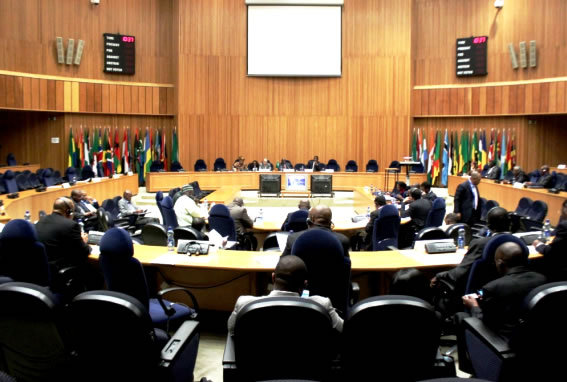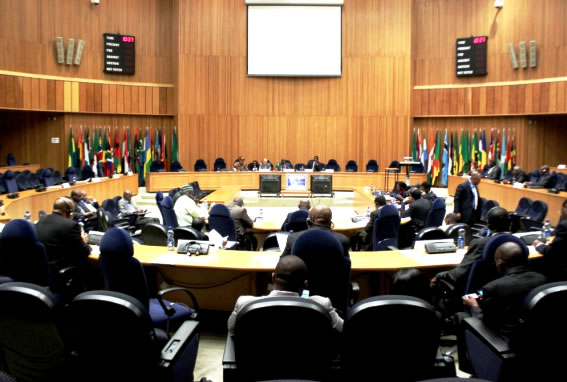
The Peace and Security Council (PSC) of the African Union (AU).
The Peace and Security Council (PSC) of the African Union (AU), held its 527th meeting, open session, on 29 July 2015, on the theme: “Early Warning Capacity of the African Union and its Relevance”;
Council took note, with appreciation, of the presentation by Mr. Vasu Gounden, the Executive Director of the Africa Centre for the Constructive Resolution of Disputes (ACCORD). Council also took note of statements made by the representatives of the United States of America, the European Union Delegation to the African Union and the United Nations Office to the African Union;
Council recalled its earlier communiqués on early warning and conflict prevention, particularly, communiques [PSC/PR/COMM.2 (DII)] and [PSC/PR/2.(CDLXIII)] adopted at its 502nd and 463rd meetings on structural prevention of conflicts in Africa, held on 29 April 2015 and on 27 October 2014, respectively. Council also recalled press statement [PSC/PR/BR. (CDXXX)] on “Silencing the Guns: Pre-requisites for Realizing a Conflict-Free Africa by the Year 2020”, adopted at its 430th meeting held on 24 April 2014 and communiqué [PSC/PR/COMM.(CCCLX)] on “The Full Use of All Available Tools in Preventive Diplomacy”, adopted at its 360th meeting held on 22 March 2013;
Council acknowledged that, in terms of Article 3 of the Protocol Relating to the Establishment of the Peace and Security Council of the African Union, one of the main objectives of the Council is to anticipate and prevent conflict. In this context, Council recalled Article 12 of the PSC Protocol which provides for the Continental Early Warning System as a mechanism for anticipating and preventing conflict.
Council noted with concern, the gap that exists between early warning and early response and reiterated the importance of strengthening the linkages between early warning and early response, which requires that the relevant AU structures act effectively on early warning information provided to them regarding potential conflicts and crises. In this regard Council stressed the imperative need of receiving regular early warning reports/briefings to enable it to take appropriate action.
Council emphasized the need for a holistic approach to early warning and conflict prevention, as well as the need for enhanced coordination within the Commission. Council also emphasized the need for regular engagements between the CEWS and the inter-Departmental Task Force on Conflict Prevention, as well as between the CEWS and the early warning systems of the Regional Economic Communities and Regional Mechanisms for Conflict Prevention, Management and Resolution (RECs/RMs), and those of Member States. In this context, Council urged the Commission to ensure simultaneous implementation of the African Peace and Security Architecture (APSA) and the African Governance Architecture (AGA), as well as the horizontal integration of early warning and conflict prevention between APSA and the Commission;
Council recognized the fundamental role of RECs/RMs in conflict prevention, management and resolution in Africa. In this regard, Council underscored the importance of vertical mainstreaming of early warning and conflict prevention between AU and RECs/RMs as well as the harmonization and collaboration of early warning activities and standards of RECs/RMs;
Council underlined the fundamental role of the Panel of the Wise, Special Envoys, Representatives and Mediators in the promotion of peace, security, and stability as well as in the prevention of conflicts and disputes on the continent. Council also stressed the need for development of scenarios for potential responses according to short, medium, and long term horizons to assist in conflict prevention efforts;
Council underscored the need for the Commission to further enhance its early warning and conflict prevention capacity. In this context, Council emphasized the need for increased human capacity within both the CEWS and the PSC Secretariat. Council further expressed gratitude to the development partners for providing technical assistance and capacity building on early warning;
Council stressed the primary responsibility of the Member States in ensuring successful conflict prevention efforts by addressing political and socio-economic development challenges. To this effect, Council urged all AU Member States that have not yet done so to sign and ratify, without any further delay, the relevant AU instruments on good governance, democracy, and human rights, as well as other relevant frameworks in order to foster sustainable peace, security, stability and development on the continent;
Council expressed concern over the issue of denial, by both Member States and RECs/RMs, of invaluable early warning information. In this regard, Council agreed to include early warning, as one of the core issues to be covered at its next retreat, which is scheduled to be held in Abuja, Nigeria;
Council acknowledged the complementarity of the work of the CEWS and the Committee of Intelligence and Security Service of Africa (CISSA). Council requested the CEWS and CISSA to provide regular strategic early warning updates to the Council; and
Council agreed to remain seized of the matter.
Council took note, with appreciation, of the presentation by Mr. Vasu Gounden, the Executive Director of the Africa Centre for the Constructive Resolution of Disputes (ACCORD). Council also took note of statements made by the representatives of the United States of America, the European Union Delegation to the African Union and the United Nations Office to the African Union;
Council recalled its earlier communiqués on early warning and conflict prevention, particularly, communiques [PSC/PR/COMM.2 (DII)] and [PSC/PR/2.(CDLXIII)] adopted at its 502nd and 463rd meetings on structural prevention of conflicts in Africa, held on 29 April 2015 and on 27 October 2014, respectively. Council also recalled press statement [PSC/PR/BR. (CDXXX)] on “Silencing the Guns: Pre-requisites for Realizing a Conflict-Free Africa by the Year 2020”, adopted at its 430th meeting held on 24 April 2014 and communiqué [PSC/PR/COMM.(CCCLX)] on “The Full Use of All Available Tools in Preventive Diplomacy”, adopted at its 360th meeting held on 22 March 2013;
Council acknowledged that, in terms of Article 3 of the Protocol Relating to the Establishment of the Peace and Security Council of the African Union, one of the main objectives of the Council is to anticipate and prevent conflict. In this context, Council recalled Article 12 of the PSC Protocol which provides for the Continental Early Warning System as a mechanism for anticipating and preventing conflict.
Council noted with concern, the gap that exists between early warning and early response and reiterated the importance of strengthening the linkages between early warning and early response, which requires that the relevant AU structures act effectively on early warning information provided to them regarding potential conflicts and crises. In this regard Council stressed the imperative need of receiving regular early warning reports/briefings to enable it to take appropriate action.
Council emphasized the need for a holistic approach to early warning and conflict prevention, as well as the need for enhanced coordination within the Commission. Council also emphasized the need for regular engagements between the CEWS and the inter-Departmental Task Force on Conflict Prevention, as well as between the CEWS and the early warning systems of the Regional Economic Communities and Regional Mechanisms for Conflict Prevention, Management and Resolution (RECs/RMs), and those of Member States. In this context, Council urged the Commission to ensure simultaneous implementation of the African Peace and Security Architecture (APSA) and the African Governance Architecture (AGA), as well as the horizontal integration of early warning and conflict prevention between APSA and the Commission;
Council recognized the fundamental role of RECs/RMs in conflict prevention, management and resolution in Africa. In this regard, Council underscored the importance of vertical mainstreaming of early warning and conflict prevention between AU and RECs/RMs as well as the harmonization and collaboration of early warning activities and standards of RECs/RMs;
Council underlined the fundamental role of the Panel of the Wise, Special Envoys, Representatives and Mediators in the promotion of peace, security, and stability as well as in the prevention of conflicts and disputes on the continent. Council also stressed the need for development of scenarios for potential responses according to short, medium, and long term horizons to assist in conflict prevention efforts;
Council underscored the need for the Commission to further enhance its early warning and conflict prevention capacity. In this context, Council emphasized the need for increased human capacity within both the CEWS and the PSC Secretariat. Council further expressed gratitude to the development partners for providing technical assistance and capacity building on early warning;
Council stressed the primary responsibility of the Member States in ensuring successful conflict prevention efforts by addressing political and socio-economic development challenges. To this effect, Council urged all AU Member States that have not yet done so to sign and ratify, without any further delay, the relevant AU instruments on good governance, democracy, and human rights, as well as other relevant frameworks in order to foster sustainable peace, security, stability and development on the continent;
Council expressed concern over the issue of denial, by both Member States and RECs/RMs, of invaluable early warning information. In this regard, Council agreed to include early warning, as one of the core issues to be covered at its next retreat, which is scheduled to be held in Abuja, Nigeria;
Council acknowledged the complementarity of the work of the CEWS and the Committee of Intelligence and Security Service of Africa (CISSA). Council requested the CEWS and CISSA to provide regular strategic early warning updates to the Council; and
Council agreed to remain seized of the matter.
 Menu
Menu
 Early Warning Capacity of the African Union and its Relevance
Early Warning Capacity of the African Union and its Relevance
















